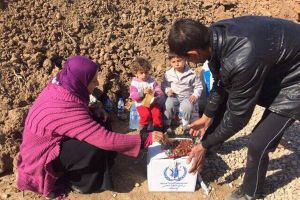WFP Concerned About Desperate Reports Coming From Families Inside Western Mosul
The United Nations World Food Programme (WFP) is extremely concerned about the humanitarian situation facing families in western Mosul, where more than 750,000 people are living in dire conditions.

A family fleeing violence in western Mosul receives much-needed food assistance upon arriving in Hamam Al Alil, a town south of Mosul.
While access to reliable information about the conditions inside western Mosul is limited, WFP’s monitoring team and partners have spoken to a number of families inside the city as they assess access and availability of food. Through telephone interviews, many distressed families said that food was unaffordable, while others said they could not access food at all. Due to increased fighting, people are afraid to leave their homes, making it even more difficult to search for essential food items.
“The situation is unbelievable,” reported a 46-year-old man from inside the city. “There is no food, no clean water, no gas for heating, no medicine and no services.”
“WFP is monitoring the frontlines and remains ready to provide immediate food assistance as soon as families can be reached safely,” said WFP Iraq Representative and Country Director Sally Haydock. “We are hearing from some families that food has drastically risen in price and is unaffordable. In extreme cases, people cannot access food at all. We appeal to all parties to the conflict to facilitate immediate and unimpeded humanitarian access to all Iraqis in need of assistance.”
So far, WFP has provided ready-to-eat food for over 6,000 people who have fled villages to the south of western Mosul. Most have made their way to Hamam Al Alil, Qayyarah Jeda’a and Haj Ali camps. WFP has enough food in stock to cover the immediate needs of 770,000 people who reside in the western Mosul area.
A recent WFP survey has found that food in western Mosul has become scarce as supply lines have been cut, and that prices of all food items have gone up significantly. As most families have been without income for the past two-and-a-half years, many people are struggling to feed their families.
Thanks to contributions from Canada, the European Commission, Germany, Japan, the Kingdom of Saudi Arabia, and the United States, WFP has provided ready-to-eat food for over one million people since the start of the Mosul offensive in October 2016. This support has been provided to all families displaced in camps and those remaining in eastern Mosul, as well as those in retaken areas within the Mosul corridor.
Source:World Food Programme
- 357 reads
Human Rights
Fostering a More Humane World: The 28th Eurasian Economic Summi

Conscience, Hope, and Action: Keys to Global Peace and Sustainability

Ringing FOWPAL’s Peace Bell for the World:Nobel Peace Prize Laureates’ Visions and Actions

Protecting the World’s Cultural Diversity for a Sustainable Future

Puppet Show I International Friendship Day 2020

